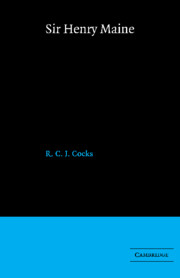Summary
MAINE'S JURISPRUDENCE
Maine's books will always be read because they were so well written; they contain the finest prose in English jurisprudence, and the quality of their style gives them a capacity to create interest even when their content has been shown to be defective. They are proof that jurisprudence can be a form of literature.
However, any lawyer who reads Maine's works is confronted with the immediate problem of ascertaining precisely what he said about jurisprudence. In considering Ancient Law and its reception we saw that there is no such thing as a ‘Mainian school’ of legal thought with a commitment to specific and coordinated views on major issues; he produced no equivalent to the Benthamite or Austinian analysis of law. In fact, his ideas cannot be accommodated within the boundaries of any jurisprudential school. His thought is not fully explicable in terms of, say, German historical jurisprudence or legal anthropology. We have seen that his ideas have remained obstinately independent of the terms invented by others.
In the light of this, the common textbook description of Maine's jurisprudence may be defended as an appropriate starting-point for understanding his legal thought. The usual emphasis upon his rejection of unhistorical and utilitarian theories, and the positive attempt to explore ‘the natural history of law’ does much to reflect his enduring concerns.
- Type
- Chapter
- Information
- Sir Henry MaineA Study in Victorian Jurisprudence, pp. 196 - 216Publisher: Cambridge University PressPrint publication year: 1988



